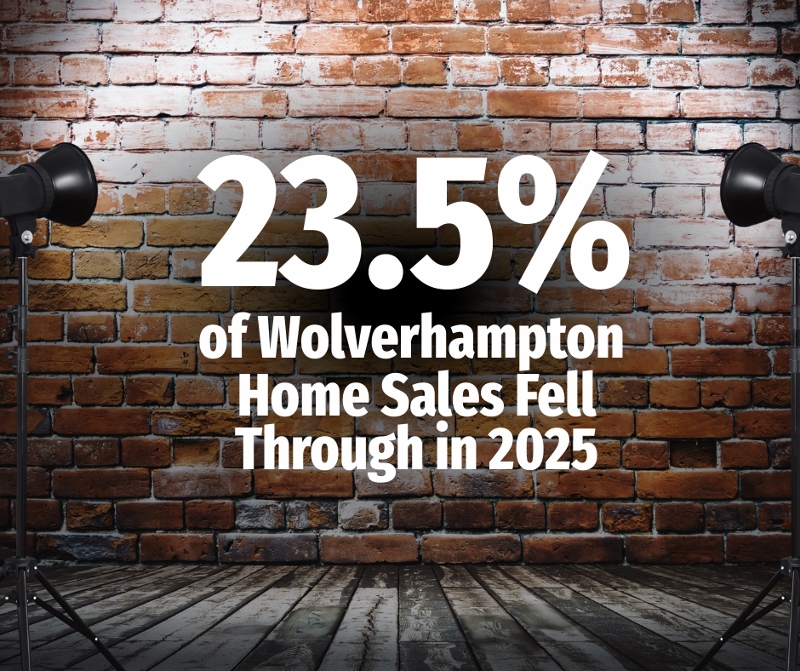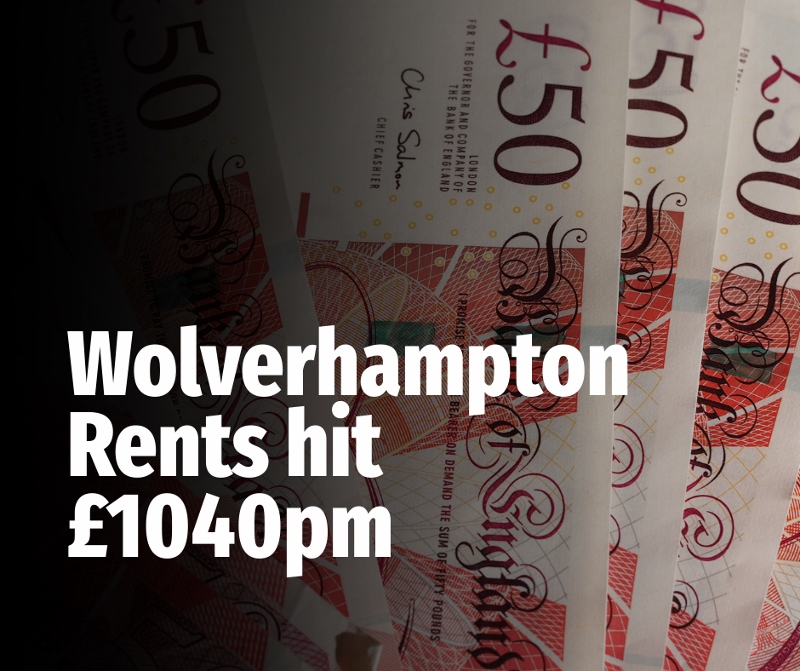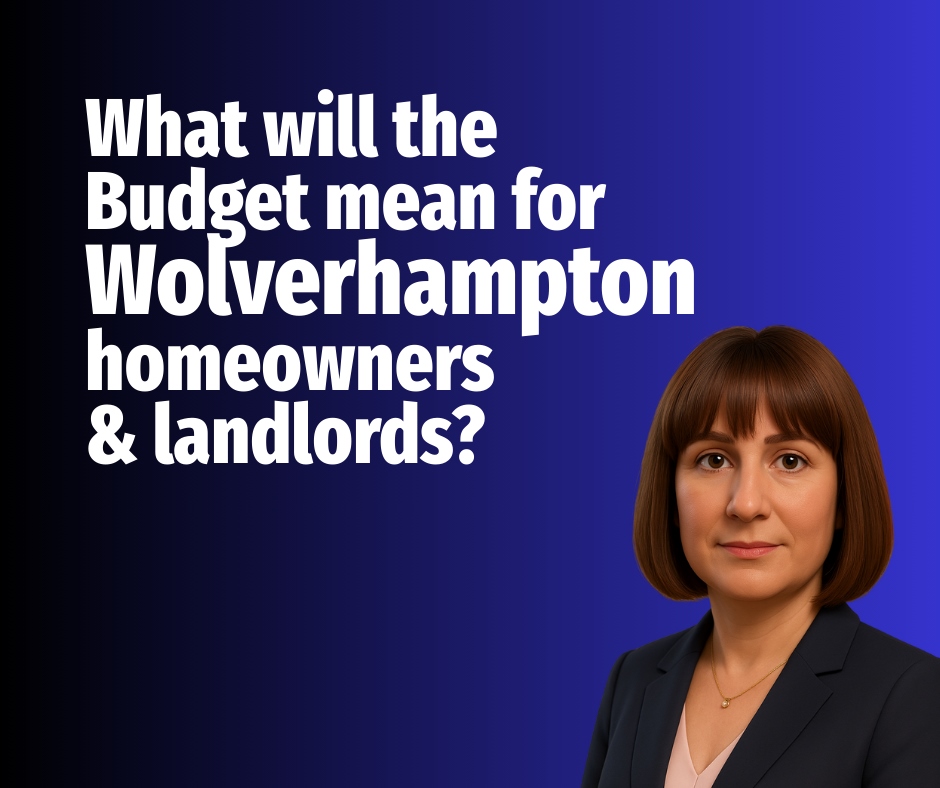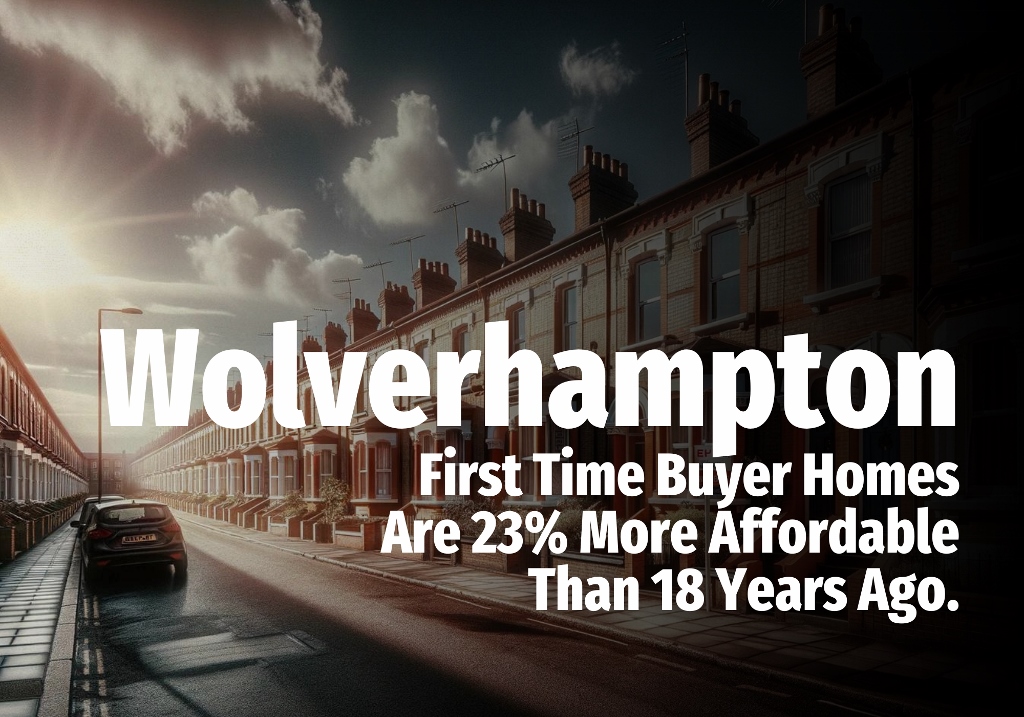Blog
- Details
What this means for Wolverhampton homeowners
In 2025, 23.54% of agreed property sales in Wolverhampton did not complete, and this is more important than many homeowners think.
In Wolverhampton, where sales chains are often longer and buyers are more sensitive to price, this has a bigger impact. Agreeing a sale has never meant a guarantee, since properties are sold ‘subject to contract’. Still, it may surprise you that nearly a quarter of agreed sales in the city fall through. That’s a high number by any standard.
To put that percentage into context, 699 Wolverhampton households lost their move to their ‘future forever home’ because the house sale fell through.
Across the UK in 2025, the rate was 23.67%, and in the West Midlands, it was 24%. So why does this happen, and what can Wolverhampton homeowners do to reduce the risk?
Why home sales fall through
The most common reason for sales falling through is buyers changing their minds, making up just over one in three failed sales. Most of these buyers lose patience with the process, which takes on average about 19 weeks from agreeing the sale to moving in (it was eight weeks twenty years ago!). Delays often happen because legal and mortgage work takes time, or because there isn’t enough communication between agents, solicitors, mortgage arrangers, and others involved.
The next biggest reason is trouble getting a mortgage, which caused just under one in three sales to fall through. Lending rules are still strict. Even buyers who seem solid at first on their initial chat with a mortgage arranger can be affected by affordability checks, hidden debt, CCJ’s, lower valuations from lenders, or changes in interest rates before the mortgage is finalized.
Survey-related renegotiations are the next most common reason, making up just under one in five cases. Often, the survey doesn’t show anything new, but buyers use it as a reason to ask for a lower price. If sellers say no, the sale often falls through.
Chain breaks accounted for only one in eight, making them the smallest category. This challenges the long-held belief that chains are the main villain of the home-moving process.
The cost of sales falling through in Wolverhampton
In 2025, 258,000 house sales in the UK fell through. The House Buyer Bureau says the average cost to someone when a sale falls through is £3,337. That means £860 million was lost in failed house sales in 2025 alone.
For Wolverhampton, this meant home movers lost £2,332,563 to failed house sales in 2025.
The 5 ways Wolverhampton homeowners can reduce risk
There is no single silver bullet to reduce the risk of a sale falling through, but there are some steps that you can do to reduce the odds of a sale collapsing.
First, choose the right Wolverhampton estate agent. The best agent isn’t just about their fee or the price they suggest, and it’s not only about finding a buyer, it’s about making sure you actually move. The real work begins after a sale is agreed, when keeping things moving is key. Good agents manage the process closely, set clear expectations, communicate often and spot problems before they become deal-breakers. They encourage everyone to act quickly on legal, survey, and mortgage steps, because delays create doubt, and doubt can end a deal. In today’s market, where sales can fall through, you should judge an agent not just by how fast or often they sell, but by how many agreed sales actually complete.
Second, instruct a solicitor as soon as your property goes on the market with your chosen estate agent, not after you get an offer. This can save weeks of delay and reduce uncertainty. I can help with this if you need support.
Third, gather your paperwork. Giving your agent and solicitor your home’s title documents, building work certificates, gas safety certificates, lease details (if it’s a leasehold), and other property information upfront helps build buyer confidence and speeds up the process.
Fourth, set a realistic price. Pricing your Wolverhampton home correctly from the start is one of the best ways to avoid a sale falling through. Only 53.5% of UK homes listed actually sell, and if a property is on the market for more than 12 weeks, its chance of selling drops to just 14.5%. Remember, one needs to find a buyer to get to a sale agreed position. Realistic priced homes tend to sell quicker than those that are not and interestingly, how quickly you sell the home has a huge difference on whether the house sale falls through. Homes that agree a sale within 25 days have a 94% chance of completing, compared to only 56% if the sale is agreed after 100 days. Also, to back that up, properties priced right from the beginning are 135% more likely to sell, take a third of the time to sell, and are half as likely to fall through. Pricing well isn’t about pressure; it’s about speed, certainty and making your move happen.
Fifth, make sure your buyer is properly checked. Your agent should follow the law and check proof of funds, a mortgage agreement in principle, and understand the buyer’s situation, including the whole chain. These checks matter more than just the offer amount.
How the right Wolverhampton estate agent can help you move home
If you are planning to move in Wolverhampton in 2026; don’t rush, prepare instead. Take your time before putting your home on the market, not after you’ve agreed a sale. Consider instructing solicitors when you put your home on the market. These steps don’t remove all risk, but they do make a real difference.
If you want to talk through fall-through rates, what they mean locally in Wolverhampton, or how to reduce the risk on your own move, start the conversation early. Calm preparation beats last-minute panic every time.
- Details
When you look back at the average rents achieved in Wolverhampton over the last five years, from 2021 through to 2025, a clear pattern emerges. Wolverhampton saw extraordinary growth in rents as the market experienced a period of exceptional pressure post pandemic, yet in the last 12 months, is now settling into something far more measured.
That distinction matters. After several years in which Wolverhampton rents rose sharply and competition among tenants was intense, 2025 represented a shift towards balance. For many local tenants, that brings welcome relief. For landlords, it brings a different set of opportunities, provided expectations are adjusted and decisions are grounded in reality rather than headlines.
So, let us look at those last five years of rents in Wolverhampton and compare them against national figures:
- 2021 average rent in Wolverhampton: £724 per month
- 2022 average rent in Wolverhampton: £811 per month
- 2023 average rent in Wolverhampton: £941 per month
- 2024 average rent in Wolverhampton: £1,008 per month
- 2025 average rent in Wolverhampton: £1,040 per month
A rise of 43.6% in 5 years.
Set against the national picture:
- 2021 UK average rent: £1,390 per month
- 2022 UK average rent: £1,549 per month
- 2023 UK average rent: £1,723 per month
- 2024 UK average rent: £1,813 per month
- 2025 UK average rent: £1,838 per month
A rise of 32.2% in 5 years.
What this shows is that while rents in Wolverhampton have risen significantly since 2021, the pace of growth has moderated during the last twelve months. That moderation is not a sign of weakness. It is a sign that the market is once again absorbing supply and demand more evenly and coming more into balance.
Why the Wolverhampton rental market has cooled without going cold
After years of intense pressure, conditions have eased. Competition between tenants is lower, supply has improved and thus rent growth has slowed.
On new lets nationally, annual rent inflation is now running at 1.4%, the slowest pace seen in around seven years. Average rents nationally sit at £1,838 per month, rising at around a third of the pace of wages (currently 4.6%). That is an important point. It signals that rents are no longer racing ahead of incomes, helping stabilise tenancies and reduce churn.
The reasons behind this shift are structural rather than temporary. Tenant demand is down by roughly a fifth compared with last year, according to Zoopla. Net migration has fallen sharply from the exceptional levels seen earlier in the decade, easing one of the biggest drivers of rental pressure. At the same time, improved mortgage availability has enabled more renters to enter home ownership, releasing additional rental stock back into the market.
This is not a market losing momentum. It is a market regaining equilibrium.
What supply looks like in Wolverhampton, year by year
Supply is the other half of the equation, and it is where many landlords misread the local picture.
Looking at the number of rental homes coming onto the Wolverhampton market:
- 2021 new rental listings in Wolverhampton: 2,766
- 2022 new rental listings in Wolverhampton: 2,932
- 2023 new rental listings in Wolverhampton: 2,680
- 2024 new rental listings in Wolverhampton: 2,746
- 2025 new rental listings in Wolverhampton: 3,346
Compared with the national trend:
- 2021 UK new rental listings: 1,353,253
- 2022 UK new rental listings: 1,261,296
- 2023 UK new rental listings: 1,243,095
- 2024 UK new rental listings: 1,240,194
- 2025 UK new rental listings: 1,356,004
What becomes apparent is that supply has improved locally over the last year or so, broadly in line with national patterns, but without overshooting demand. That is a crucial distinction. Wolverhampton has not suddenly become oversupplied; it has simply moved away from the shortage conditions of the last couple of years.
Why this is good news for Wolverhampton tenants & sensible news for landlords
For Wolverhampton tenants, the benefits are obvious. More choice, fewer bidding wars, and less pressure to make rushed decisions. That leads to longer, more stable tenancies and better outcomes on both sides.
For Wolverhampton landlords, it is my opinion the opportunity lies in one’s shifting focus. The most successful landlords are rarely those who chase the maximum headline rent every year. They are the ones who prioritise a balance between occupancy, tenant quality, and long-term income without any hassle.
In a calmer Wolverhampton rental market, pricing accurately matters more than pricing aggressively. Overstretching on rent is more likely to result in void periods, which erode returns far faster than a modest increase improves them or attracts a certain type of tenant that might not be as reliable in paying the rent or keeping the property in good condition.
Stable prices strengthen the investment case for Wolverhampton buy-to-let
Another factor often overlooked is house price stability. A stable sales market in Wolverhampton makes it easier for landlords to plan, whether that is buying, refinancing or rebalancing a portfolio.
When prices are not swinging wildly, investors can assess opportunities based on fundamentals rather than speculation. Yield, tenant demand and running costs come back to the front. For landlords considering entering or expanding in Wolverhampton, that stability reduces risk and supports more confident decision-making.
What a professional approach looks like in 2026 and beyond
As the Wolverhampton rental market normalises, a more professional approach becomes essential.
Properties that are well presented, well maintained and sensibly priced continue to let well in a timely manner. Clear communication around rent reviews helps maintain trust. Landlords who understand their local data, rather than relying on national headlines, are better placed to make informed decisions.
This is also a market that rewards compliance and good management. As standards rise across the sector and with the new rental legislation already introduced, (plus what is on the horizon with the Renters Rights Act) those already operating properly will find the transition far smoother than those who have relied on scarcity to mask weaknesses.
Looking back at rent data from 2021 to 2025, the long-term trend remains positive. What has changed is the pace, not the principle.
For Wolverhampton landlords, 2025 marks a return to a market that rewards patience, preparation and realism. Tenants benefit from greater fairness and choice. Landlords benefit from stability, predictability and the ability to build sustainable income over time.
In short, a calmer rental market is not something to fear. For those taking a long-term view in Wolverhampton, it may well be exactly the environment in which sensible decisions deliver the best results.
- Details
As the new year begins, many homeowners and landlords start thinking about what comes next. Whether you’re considering selling your property, letting an investment, or simply exploring your options, the right advice at the right time can make all the difference.
We provide a considered, professional approach to selling and letting across Wolverhampton, Walsall, Wednesfield, Dudley, Sedgley and Willenhall. With a strong understanding of local market conditions and a focus on clear communication, we help our clients move forward with confidence and clarity.
Our team takes the time to understand your goals, offering honest guidance, carefully considered marketing and a service built on long-standing local knowledge rather than empty promises. From accurate pricing to thoughtful presentation and ongoing support, every detail is handled with care.
If a move or a new letting is part of your plans for the year ahead, we’d be delighted to have a conversation.
Contact us today to discuss selling or letting your property and start the year with a trusted local agent by your side.
- Details
The Chancellor’s Autumn Budget has finally arrived after months of rumour, leaked ideas and speculation. Many households in Wolverhampton had braced themselves for a sweeping new annual tax on homes above £500,000. That proposal has now been dropped, which removes the biggest cloud that had been hanging over the local market. Instead, the Government has opted for a more focused approach by introducing a new high value council tax surcharge that only applies to properties valued above £2 million. Alongside this, landlords will face higher property income tax from 2027 and the wider rental sector will continue to feel the pressure created by years of rising costs, stronger regulation and increasing demand.
This report brings those national announcements into a local Wolverhampton context. It considers how the changes could influence homeowners, landlords and tenants, and where the opportunities and risks may appear in the years ahead.
The end of the feared £500,000 annual charge
For Wolverhampton, the most significant early headline is what has not happened. The much-discussed idea of an annual tax on all homes above £500,000 has been ruled out. Let us not forget that quite a few homes in the area are above that £500k threshold.
Of the 106,910 homes in the Wolverhampton area,
there are 3,819 homes worth over £500k
Removing it should strengthen confidence among homeowners who were delaying decisions to move, extend or sell because they feared a new recurring cost.
Stamp duty remains unchanged. This means that the thresholds set more than a decade ago continue to apply. In practical terms, most Wolverhampton buyers will still pay only modest stamp duty, with first-time buyers retaining the current reliefs on properties up to £300,000. The system may not be perfect, yet the absence of change avoids further friction at a time when the market needs stability rather than disruption.
The new mansion tax for homes above £2 million
From April 2028, a new high value council tax surcharge will apply to homes worth more than £2 million. It will begin with an additional £2,500 a year for properties between £2 million and £2.5 million, rising to £7,500 for homes worth more than £5 million.
Nationally, this will affect around 0.5% of homes and around 85% of those are in London and the South East.
In Wolverhampton, the scale is vastly smaller.
Of the 106,910 homes in the Wolverhampton area,
there are only 16 homes worth over £2m
(Wolverhampton area = WV1/2/3/4/6/10/11).
Buyers at the very top of the market will not welcome an extra annual bill, although for purchasers spending £5 million or more, the surcharge is relatively modest compared with stamp duty which can already exceed £500,000. For owners who bought their home many years ago and now live on a pension, any extra annual cost will feel more significant. However, the option to defer payment until a sale or death should prevent financial hardship and should also reduce the likelihood of forced sales or a sudden flood of properties coming to the market.
Higher property income tax for landlords
Landlords will face a 2% rise in the basic, higher and additional property income tax rates from April 2027. The new rates will be 22%, 42% and 47%. This follows a long list of changes over the last decade that have already reduced the returns landlords enjoy. These include cuts to mortgage interest relief, the stamp duty surcharge, the shrinking of capital gains tax allowances, and the new obligations set out within the Renters Rights Act and the energy efficiency rules.
Wolverhampton rents have increased from £677 pcm in 2020 to £986 pcm, a rise of 45.6%
However, higher rents must be understood in the context of wages. The average full-time wage in the West Midlands has risen from £554.10 per week in 2020 to £730.40 a week. Tenant affordability remains the key driver of rental values, and responsible landlords will continue to balance fair rent increases with realistic expectations of what tenants can pay. For most landlords, rising gross income has helped offset rising costs, but it has not created excess profit. That is why any change to taxation must be approached with care.
What this means for Wolverhampton tenants
Although this report is mainly for homeowners and landlords, tenants will read it too. It is important to acknowledge that they have faced the sharpest rise in living costs for a generation. The concern is that fewer landlords in the system could reduce rental supply which then pushes rents higher. A balanced market needs enough private rental homes to meet local demand. If rules or taxation become too heavy handed, the long-term effect will be fewer choices for tenants and higher rents.
What this means for Wolverhampton homeowners
For most Wolverhampton households, the Budget will feel less dramatic than many feared. The absence of a £500,000 annual charge has avoided what could have been a major distortion. The new mansion tax will touch only a tiny fraction of the local Wolverhampton market. The valuations of current band F, G and H homes will be reviewed, but this is a nationwide exercise and not a Wolverhampton specific event.
The broader outlook remains relatively steady. Forecasts suggest that UK house prices will rise from an average of 1% to 2% a year for next couple of years. That is broadly in line with expected ‘real’ wage growth.
Our final thoughts
The Budget has nudged the property market rather than shaken it. Wolverhampton homeowners have more clarity. Landlords have further costs to plan for, but also a continuing rise in demand for good quality homes to rent. Tenants continue to face pressure, yet a well-managed and well-supplied rental sector remains essential for the town.
As always, Wolverhampton’s property market will respond to these changes in its own quiet and measured way. Stable rules, rising wages and sensible pricing will be the real drivers of activity over the next few years.
- Details
If you listened to the doom merchants, you would think first-time buyers (FTB) in Wolverhampton had no chance at all. According to the loudest voices, buying a first home is impossible, the ladder has been pulled up, and the only people who buy their first homes today are lottery winners or those with wealthy parents. The story is always the same. Prices up, wages squeezed, and doors slammed shut.
Yet when you scratch beneath the surface, the facts tell a very different story. In truth, the numbers completely overturn what many people believe. They also offer something precious. Hope. Real hope, backed by evidence rather than headlines.
Let us start with the part that always shocks people. Wolverhampton starter homes have increased in value by 52.1% since 2007 (18 years ago). At first glance, that looks like an affordability disaster. The average first-time buyer home in Wolverhampton now sits at £155,000, and the average salary is £26,893. If that is all you looked at, you would be forgiven for thinking first-time buyers have been frozen out.
But the headline price and average salary are not the real story. What matters is the mortgage's monthly cost as a percentage of take-home pay. That is the accurate measure of affordability.
And this is where everything changes.
In 2007, a Wolverhampton first-time buyer household spent 41.8% of its take-home pay on mortgage payments. Today, that figure is 31.6%. That is a 24.3% proportionally lighter burden on today’s first-time buyers' household budgets compared to those of first-time buyers in 2007.
Yet it gets even more interesting when we go back to the late 1980s.
In 1989, a Wolverhampton first-time buyer household spent 48.0% of its take-home pay on a mortgage, meaning mortgage payments take 34.1% less of today’s first-time buyer household budget than in 1989.
This shows that Wolverhampton's first-time buyer affordability is not a recent thing; it is a long-term moving trend.
People then ask why this has happened. The answer lies in a combination of rising real household incomes, (UK wages are 139% higher than 1997 but a lot of that is inflation. Yet even when we strip out inflation, wages are still 23% higher in real terms), lower interest rates than the painful levels seen in the late eighties, and the structure of modern mortgage products (repayment mortgages of 30/35 years as opposed to endowment mortgages of 25 years). Also, for context, interest rates in 1989 were 14.88%. Even an average home buyer had very little room to breathe when such a large part of their income was swallowed by interest alone.
Of course, Wolverhampton itself has changed. Improved transport links and local investment have attracted more young professionals and families. Developers have brought forward new homes. The mortgage market has also expanded, with longer-term products and competitive rates. All of this feeds into affordability.
There is another factor that rarely gets the attention it deserves. Rents are rising at a pace that makes home buying look increasingly attractive. A fixed-rate mortgage gives you stability. Your payment is your payment. Renting does not offer that. Every year, you can be hit with increases that provide no long-term benefit. Many people find that their mortgage payment is not dramatically higher than their rent, and in some cases, it is lower.
This brings us to the biggest hurdle for most first-time buyers - the deposit.
The newspapers love to talk about the average first-time buyer deposit. In 2025, according to UK Finance Key Mortgage Market data, the average was £49,511 for the West Midlands. It is an eye-watering figure that scares people into believing they must find that amount.
But this average is misleading. It reflects the choices of buyers who want lower interest rates or who have family support. It is not the minimum needed.
The minimum deposit is 5%. A 95% mortgage is perfectly normal, and has been for more than sixteen years. If you have a solid credit history and stable income, lenders will look at you favourably. Some lenders even offer 100% mortgages, though these require strong credit ratings and are not for everyone. Still, the point stands. The idea that you must save £50,000 or more is not accurate for most buyers.
At the time of writing, the best 95% 5-year fixed rate deal is 4.7%. A 75% mortgage sits at 3.8%. Yes, the bigger the deposit, the better the rate, but the absence of a huge deposit does not put Wolverhampton homeownership beyond reach. You can also reduce your monthly payment by choosing a longer term, something many Wolverhampton first-time buyers may wish to do.
Homeownership also creates something that renting never will. Equity. Every payment is a step towards owning an asset. Rent gives you shelter but nothing else. When you retire, owning your Wolverhampton home puts you in a far stronger position. Relying entirely on rental support from the local authority, with their limits on what support can be offered, often means downsizing, whether you want to or not.
The truth is simple. Raising a deposit is tough. No one denies that. It takes discipline, sacrifice and patience. Yet once you get past that hurdle, the affordability of the monthly mortgage is far better than people think. The numbers prove it.
Buying a first time home in Wolverhampton is not easy, but it is possible. And for many families, that realisation alone will be a breath of fresh air.















